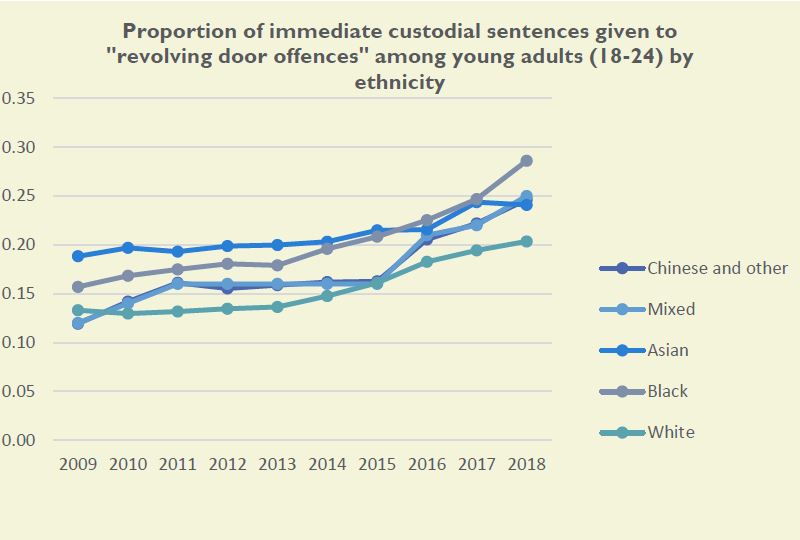An avoidable cycle of crisis and crime
Last week (6 August 2020) the Revolving Doors Agency published an analysis of government data that shows Black young adults (18-24) are significantly more likely to be dragged into the criminal justice system for relatively low-level and non-violent offences, such as theft or minor drug offences. Rather than being given the support they need, they are swept away into our criminal justice system.
Ministry of Justice data reveals that:
- Repeat offenders account for nearly 40% of all people in the criminal justice system – the highest levels on record.
- The proportion of Black adults that are convicted of 16 or more offences has doubled between 2000 and 2016 – now constituting 10% of all repeat offenders.
Black young adults are:
- Twice as likely to receive a caution
- 8.4 times more likely to receive a conviction
- 1.5 times more likely to be sent to prison
- Given prison sentences that are 80% longer than those given white young adults who commit similar offences.
Over the last 10 years the number young adults going through the criminal justice system has significantly decreased, but…
- The rate of fall has been different across ethnicities. The fall for white young adults was 55% and for Black young adults was 34%. This has led to an increase in the proportion of Black young adults in the system.
- Sentencing has become harsher for everyone. There are falling rates of community sentences and increasing rates of immediate prison sentences. Black young adults are less likely to get a community sentence and more likely to receive an immediate custodial sentence than their white counterparts.
Data gaps
The report, Racial bias is pulling Black young adults into the revolving door, authored by Burcu Borysik (@BurcuBorysik) puts a spotlight, once again, on the need for accountability in the system. Much of the data
on ethnicity in the criminal justice system is incomplete, out of date, unpublished, inconsistent, or
otherwise problematic. It highlights specific questions which cannot be answered by the current data:
- Why there is no publicly available data on cautions broken down by offence types, ethnicity and local areas from 2015 onwards, and how the over-representation of Black young adults in cautions for relatively minor and non-violent offences has changed since 2014.
- Why nearly half of the convictions for low-level and non-violent offences are missing information on the ethnicity of the person who is sentenced, and how the CPS might be better able to collate this information to enable public scrutiny.
- How many young adults committing low-level, non-violent crimes have been diverted away from the criminal justice system (through routes such as no-further-action, conditional caution and deferred prosecutions) and what proportion of these were Black young adults.
- To what extent the over-representation of Black young adults is driven by the earlier stages in the criminal justice pipeline, such as stop and search, or by the diminished use of police discretion to divert.
What needs to change
This evidence briefing from Revolving Doors Agency echoes the recommendations of the Lammy Review, arguing that where racial disparities are revealed, government must either explain them or reform systems to tackle them.
It suggests four main action points:
- All public services, including police, should publish data broken down by ethnicity in all instances. They should then provide an evidence-based explanation as to why there are racial disparities and demonstrate what they are doing to reform and tackle inequalities. This commitment should be led jointly by the Home Office and the Ministry of Justice to assess the conduct of police and, separately, the outcomes at court.
- Her Majesty’s Inspectorate for Constabulary and Fire and Rescue Services must play a vital role in encouraging and enabling the police services to publish better data on ethnicity.
- Police and Crime Commissioners should provide local leadership on race inequality in policing.
- The potential of pre-court diversion schemes should be explored to tackle both disproportionate representation and poorer outcomes for Black young adults.








